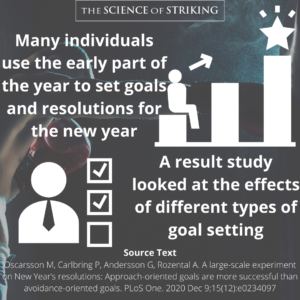Many individuals use the early part of the year to set goals for the year ahead. The goal setting process can be conducted in a number of different ways. A recent study looked to assess the effect of different types of goal setting on desired outcomes. ⅔ of the goals were related to health, fitness, weight loss or nutrition.
1,066 Swedish participants were separate into groups based on the degree of support provided:
- No support
- Some support, who were given information about the importance of social support, and provided with monthly follow-ups.
- Extended support, who were, in addition, provided with information regarding the formulation of SMART goals, and encouraged to set goals that were approach oriented, rather than avoidance-oriented.
All participants completed a survey relating to their resolutions and their level of belief in their ability to achieve them. They were followed up in June and December to evaluate their success.
- Approach-oriented goals were associated with greater success in goal achievement
- Goal achievement was then related to superior quality of life and self-efficacy scores.
- Interestingly, the “some support” group reported greater success than the other two groups, suggesting that the SMART framework may not be the best system for setting health-related goals.
Oscarsson M, Carlbring P, Andersson G, Rozental A. A large-scale experiment on New Year’s resolutions: Approach-oriented goals are more successful than avoidance-oriented goals. PLoS One. 2020 Dec 9;15(12):e0234097
https://journals.plos.org/plosone/article?id=10.1371/journal.pone.0234097


